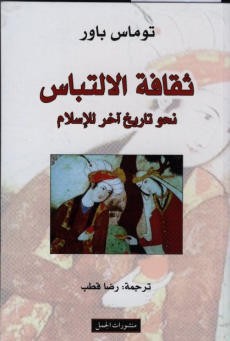The Monograph “Culture of Ambiguity” in Arabic
A Book by Islamicist Thomas Bauer made available to Arabic readers

The widely acclaimed monograph “The Culture of Ambiguity” by the Arabist and Leibniz prize winner Prof. Dr. Thomas Bauer of the Excellence Cluster “Religion and Politics” of the University of Münster has been recently translated into Arabic. In this book Bauer surveys some thousand years of Arabo-Islamic cultural history shedding light on a wide range of aspects: from religion, law, politics, literature and the arts to attitudes towards sexuality and minorities. Under the title Culture of Ambiguity: An Alternative History of Islam
(Arabic:ثقافة الالتباس - نحو تاريخ آخر للإسلام , he describes how the Arabo-Islamic societies of the pre-modern era succeeded in integrating conflicting norms and shows how they dealt with ambiguity and polysemy with particular reference to Koranic exegesis, sexual morality, poetry, law and political discourse.
As Bauer points out, over the centuries, Islam has been much more tolerant of different values and claims of truth than previously thought. “Today, there is a growing interest in a different image of Islam both in the Arab world and among Muslims in Europe”, he notes. “Therefore, and particularly for the benefit of younger generations, it is time to make academically solid representations of the time-honoured Muslim culture available there as well”. The book, subtitled “An Alternative History of Islam”, was first published by Verlag der Weltreligionen in Berlin in 2011 and has been positively reviewed several times. The Arabic translation by Rida Qutb has been recently published by Al-Kamel Verlag, which is based in Cologne, Beirut and Baghdad. A Slovenian translation was published by the Založba Krtina publishing house in Ljubljana in 2014. An English version is scheduled to be published by Columbia University Press in New York in 2018.
Modern philologists are accustomed to assume that one of two possible interpretations of a given text must be wrong. The Muslim exegete of the past, however, perceived textual ambiguity as willed by God, as “a divine ruse that stimulates human beings to engage in reading the text again and again”. The traditional scepticism of Muslims towards Koran translations, too, arose from this assumption; because a translation normally reproduces only one of the many possible meanings.
“Unambiguous Norms First Established Through Colonialism”
“The image of Islam in the West has never been as negative as today”, Bauer remarks. With this book, he aims at refuting the “distorted image” of a politically and religiously dogmatic, intolerant and prude Islam that the West has set up as a “substitute enemy” since the collapse of the Eastern bloc. “In the 19th century colonialism first exerted pressure on Middle Eastern societies to define themselves through unambiguous norms as was done in the West”, he explains. If nowadays Islamism represents a narrow-minded claim of truth, it is because it has adopted Western ways of thinking. “This is only an ostensible return to ‘traditional Islamic values’”. What are today perceived as ‘Islamic’ ideas are actually nothing but a relaunch of Victorian ethics.
Bauer believes that it is wrong to speak of a “re-Islamisation” in the 20th century. Islamism is “a completely new creation of an intolerant, ideological Islam” patterned on the totalitarian structures of earlier Western ideologies that had been intolerant of a plurality of opinions. In the West, this has changed after 1968. “This awakening, however, has not occurred in the Muslim world. After all, what is lacking in Islam is not the Enlightenment as it took place in Europe in the 18th century, but the 1968 revolt”. (vvm/ill)
The Culture of Ambiguity: Some Examples
- Koranic Exegesis: As Bauer points out, the Koran contains numerous ambiguous passages. While Muslim scholars of earlier centuries perceived the variants as enrichment, Muslims today perceive them as an embarrassment. “Be they reformists or fundamentalists, they always think they know what the true meaning of a passage of the Koran is”.
Earlier scholars literally celebrated the plurality of interpretations of the Koran, he comments. They developed a method that allowed them to consider all possible interpretations instead of declaring only one of them as valid. Thanks to this “probability theory” they avoided using the categories of right and wrong. “In this way, a tolerant mode of resolving ambiguity conflicts evolved. Nevertheless, this sort of conflict resolution could not keep pace with the rapidly intruding Western modernity and disappeared in the face of new dogmatic-ideological constructions”. - The Scholar’s Image: In the classical period of Islam, differences of opinion between scholars were viewed as “a mercy for the community”, as Bauer points out. “Today, by contrast, many people perceive them as an evil that must be wiped out”. In earlier times, the ideal of the saintly and devout scholar co-existed with that of the worldly and witty intellectual. The secular literature of such thinkers, however, is totally misunderstood and misappreciated by their modern heirs.
- Sexuality: Islam is nowadays often described as “medieval” and prude. It supposedly needs a sexual revolution modelled on the sexual revolution that has taken place in the West. Yet history draws a different picture, Bauer argues: “As early as the 9th century, Arab physicians wrote manuals on sex. They thus continued an ancient tradition that was only interrupted by the emergence of Christianity. Over several centuries, Arab physicians discussed sexual hygiene in a pragmatic way, unencumbered by moral strains”. Between 800 and 1800 countless homoerotic poems were composed, homoerotic poetry being an established genre of classical literature. This tradition came to an end only in the 19th century, when people became aware of the existence of these texts in the West and “disparaged them as pornography”.
- Religion and politics: A most misleading prejudice, according to Bauer, is the claim that there is no separation between state and religion in Islam. In reality, “religion-free zones have always existed in Islam”. Muslims have always been able to distinguish between worldly and religious matters.
In classical Islamic times, secular and religious political discourse co-existed, Bauer notes. Only a handful of books discussed political power and the state from a religious perspective. “By contrast, there are a vast number of poems praising rulers as well as numerous works offering political advice to rulers, in which religion plays only a subordinate role”.
Bauer discards the nowadays-widespread idea of the “Islamisation of Islam”: One ought not to ascribe to Islam more religiosity than to other cultures. The often-cited slogan, according to which Islam is “Din wa-Dawla”, that is “religion and state”, first emerged in the 19th century when Muslim countries were in quest of an ideology that could counter the powerful Western ideologies of that era, Bauer stresses. “In general, the contemporary politicised Islam arose from a mind-set that cannot be derived from traditional Islamic writings. On the contrary, it was patterned on Western models”. - Law: Islamic law is not as rigid and dogmatic as is often depicted today, Bauer adds. “On the contrary, for more than 1,300 years Muslims have been applying numerous of its norms in their daily life in a happily flexible manner”. Legal scholars often avoided making absolute claims of truth. They did not wipe out uncertainty and contradictions, but appeased them by means of a probability theory. In the face of growing Western domination, however, Muslims have started to ideologise and politicise their law. “Today, both fundamentalists and pro-Western reformist Muslims claim that Islamic law must be interpreted unambiguously”.
- Literature and rhetoric: Over the centuries, Arab poets have cultivated sophisticated forms of ambiguous expression, as Bauer demonstrates by several examples. Arab philologists and rhetoricians used to collect ambiguous words and analyse stylistic devices of ambiguity. “In this way, hundreds of works of rhetoric were produced. Learned poets, scholars, merchants, craftsmen and popular poets composed countless poems and prose texts in which they uninhibitedly experimented with all conceivable sorts of ambiguity”. This was a kind of “ambiguity training”, so that people might grow tolerant of ambiguity in other areas of life as well. Today, however, many Arabs and Orientalists perceive this diversity “as a clear sign of the decadence of Islam”.
Theoretical Considerations on Ambiguity-Tolerance
The term ambiguity-tolerance is used in psychology to describe the ability of a human being to endure ambiguity, that is, to let conflicting values and truths co-exist without insisting on the validity of his/her own conviction.

The concept of ambiguity-tolerance can be transferred to the study of cultural history and the history of mentalities, as Bauer shows in his book: All cultures must endure ambiguity. However, each of them deals with it differently. Some cultures avoid or fight ambiguity. Others show a high degree of ambiguity-tolerance. In Islam ambiguity was tolerated for a long time; in some cases, it was even deliberately created. For ambiguity had important cultural functions – for example in the fields of etiquette and diplomacy, in ritual and the arts. Since the 19th century, a radical transformation has occurred in Muslim culture – a transformation that in its intensity and drastic consequences has no parallel in any other culture: the move from a relatively high tolerance to an occasionally extreme intolerance of all phenomena of ambiguity and plurality.
In the history of mentalities, Bauer argues, one can only step out of the Eurocentric perspective and place the thoughts, feelings and actions of the people he studies at the centre of his enquiry, if one accepts the principle of cultural ambiguity. This can lead to an alternative, non-teleological historiography. The subtitle of the book, “An Alternative History of Islam”, can therefore be interpreted in many different ways, Bauer stresses. He does not propound another history of Islam, but offers an alternative ‘story’, which also casts doubt on the apparent naturalness of Western culture. (vvm)
The Author
Thomas Bauer (born 1961) has been Professor of Islamic and Arabic Studies at the University of Münster (Westfälische Wilhelms-Universität Münster) since 2000. 2007-2017: Principal investigator at the Excellence Cluster “Religion and Politics” of the University of Münster and Member of the Cluster’s Governing Body; currently: head of the research project B2-3 “At the Intersection of Discourses. Ibn Nubata al-Misri (1286-1366) and the Culture of Ambiguity”.
2002-2006: Director of the “Centre of Religious Studies” (CRS) of the University of Münster. 2006-2007: Fellow at the Institute for Advanced Study in Berlin.
In 2012 he was elected as Member of the North Rhine-Westphalian Academy of Sciences, Humanities and the Arts. In 2013 he was awarded the “Gottfried Wilhelm Leibniz Prize” of the German Research Foundation (DFG). Research areas: history of culture and mentalities of the Arabo-Islamic world, classical Arabic literature.

